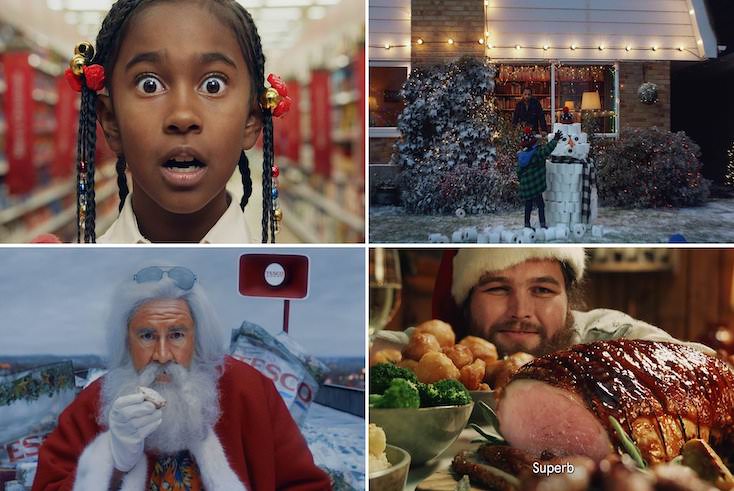Oops…guess who’s on the naughty step & the ad mausoleum calls

When supermarkets were given a golden opportunity to match actions to words, some of them simply flunked it, says Dominic Mills
When the creatives at BBH came up with the naughty step idea for Tesco’s Christmas campaign, they can have little imagined how the idea might take on a whole extra dimension or, indeed, almost bite the Tesco corporate entity in the arse.
That’s because an almighty row blew up last week over the government package of rate relief aid amounting to, in Tesco’s case, £585 million.
In the end, after prevarication and internal debate said to have gone on over two days by one newspaper, Tesco relented, agreed to pay back the money and, in effect, reluctantly climbed off the naughty step. Back in October, it was adamant it wouldn’t.
I should say by the way, that I love the naughty step ad, and I liked the twist employed in a partnership with ITV by employing the celebs voted out of I’m a Celeb in fast-fire cameos – fun, eye-catching and clever.
Why does any of this matter? Well, over the period of Covid the supermarkets generally, and Tesco from my own personal experience, have stepped up to the plate in spectacular style. In terms of reputation, they have enhanced their status no end. They were there when we needed them.
But they have also benefited enormously, with sales growing in double-digit amounts over the period, and spiking during the many weeks of lockdown, benefiting both from increased eating and drinking in, as well as non-food sales while non-essential retailers were closed.
Kantar, for example, has Tesco’s sales growing more than 9% in the 12 weeks to early October — more since then, we can assume.
And while its market share may not have moved significantly (around 27%) it, like its peers, is benefiting from a bigger pie some of which may be sustained over future months or as long as our changed shopping habits continue.
Unsurprisingly then, the pressure to repay some of Rishi Sunak’s rates-relief largesse has grown.
Some supermarkets, but not all, have followed Tesco’s lead.
Sainsbury’s, after initially saying it wouldn’t, coughed up the portion of relief that related to its supermarkets but not to Argos, on the grounds that as a non-essential retailer Argos needed the help.
Others, Morrisons, B&M, Asda and Aldi, have also followed.
But not M&S, John Lewis/Waitrose and the Co-op, with the first two claiming — unlike Sainsbury’s and Argos — that they could not separate out the food and non-food parts of their businesses. This is nonsense. Within a mile of where I live, there is a standalone M&S food store and Waitrose, although in the same building, has a separate entrance to John Lewis.
One of the long-term effects of Covid is the increased scrutiny to which we subject businesses, judging them not just on their words but also on their actions, in particular their contribution to wider society. And, quite legitimately, much of the advertising we have seen this year, not just around Christmas, centres on this message.
The Co-op, for one, has long made much of its role in supporting its communities — and, indeed, generally lives up to this claim — while JLP/Waitrose takes a similar line.
The latter’s Christmas ad aims to raise £5 million for charities — ‘Give a Little Love’ — as the soundtrack puts it. But there’s not much love being shown to the taxpayer who, you could argue, deserves some succour.
It’s depressing, isn’t it? Given the opportunity to match words and actions, some of them flunk it.
Still, while the £1.7 billion in rates relief handed back is small change in comparison with the parlous state of the public finances — just more than a day’s worth of the £55 billion Rishi is currently borrowing every month — we can at least say that every little helps.
An ad that will go down in history — Debenhams’ final effort
Like many, I suspect, I am not remotely surprised that the high priests of receivership are currently reading the last rites over the broken body of Debenhams.
But I am astonished to see that it has actually produced a Christmas ad. This must be the ultimate triumph of wishful thinking.
Here it is, a sad, limp effort designed to persuade us that Debenhams is the destination for those who want to ‘give the gift’, forlorn in a way that exactly matches its stores.
I hope that the production company that made the ad, and the media owners that host it, have been paid upfront.
And so we must consign this effort to the great advertising mausoleum where it will sit alongside those from the likes of Woolies, Comet, Phones4U and BHS, all of which sought at one time to produce Christmas blockbusters. And of course, come January or February, they will be joined by a clutch more.
There was an interesting piece in Campaign last week asking whether advertising could ever have saved the Debenhams brand.
The answer is no — Debenhams was brought down by failures far removed from advertising — but it’s possible that, had it got it right 10-15 years ago, it might have had a fighting chance.
Meanwhile, as a final clear-out sale looms, it might as well repurpose the ad with giant 90% off tags.




